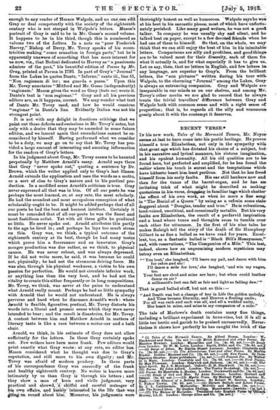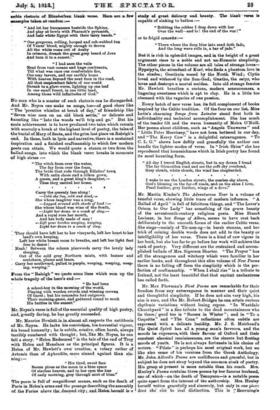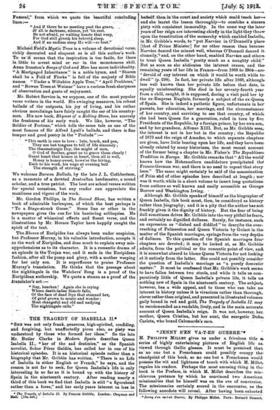RECENT TERSE.*
IN his new work, Tales of the Mermaid Tavern, Mr. Noyes seems at last to have come into his poetic heritage. He proves himself a true Elizabethan, not only in the sympathy witli that great age which has dictated his choice of a subject, but in his narrative and lyrical manners, his riotous imagination,. and his opulent humanity. All his old qualities are to heo found here, but perfected and amplified, for be has found the nattier where his touch is surest and the temptations whicla have hitherto beset him least perilous. Not that-he has freed himself from his early faults. His ear still hankers now and then for the -tunes of the barrel-organ, and he has am imitating trick of what might be described as making- quotations in his-verse, draggling in familiar tags which shatter the effect of his own work, as when he mars a fine song- in "The Burial of a Queen" by using as a refrain some stale- doggerel about "Douglas, tender and true." He is robustiown. loud-voiced, uncritical, and occasionally metallic. But his very faults are 'Elizabethan, the result of a perfervid inspiration and a head where tunes and thoughts seem to tumble over each other for utterance. In the first of his nine tales he- makes Raleigh tell the story of the death of Sir Humphrey- Gilbert in as fine a ballad as we have read for years. Excel- lent, too, as a fantastie ballad is "Black Bill's Honeymoon,' and, -with 'reservations, " The Companion of a Mile." This last;. indeed, shows how an unpromising modern mysticism may betray even an Elizabethan.
" You lout,' she laughed, leave my pail, and dance with hires
for cakes and ale!
I'll dance a mile for love,' she laughed, 'and win my wager. too.
Your feet are shod and mine are bare; but when could leather dance on air? A milkmaid's feet can fall as fair and light as falling dew.'"
That is good ballad stuff, but not so this :--
"And Death was but a change of key in Life the golden melody*. And Time became Eternity, and Heaven a fleeting smile; For all was each and each was all, and all a wedded unity, Her heart in mine, and mine in my companion of a mite"
The tale of Marlowe's death contains many fine things,. including a brilliant experiment in terza-rirna, but it is all is little too hectic and garish to be praised unreservedly. Never- theless it shows how perfectly he has caught the trick of the.
• (1) Tales of the Mermaid Tavern. By Alfred Noyes. London W, Blackwood and Sons. [6s. net.1-(2) lielen Redeemed and other Poems. By Maurice Hewlett. London : Macmillan and Co. [4s. 6d. net.]-(3) Songs from 1,eenster., By W. M. Letts, London : Smith, Elder and Co. f2s. 6d. net. -(4) Songs of Alban. By Emilia Stuart Lorimer. .Lonodon: Constable an& Co. [2s. 641. net.]-(5) The Adventurous Year and other Poems. By Martha Kinder. Dublin: Mammal and CO. [2s. 6d. net.](6) New Poems. By Dora Sigerson Shorter. Seine publishers. [1s. net,]-i7) Peacock Pie. By Walter. de la Mare. London: Constable and Co. [s. 6d. net.]- (8) First Poems, By Max Plowman. .London: Sidgwick and Jackson. 12s. 6d. net.)--19) The. Quiet Spirit. )3y J. S. Mnirliod. Omford: 13. f. Blackwell [28. 6d. net]. (10) Poems. By John Alford. London: The PoetryBookshop. 128. net.]--; LH) Poems. By Henrietta, A. Huxley. London Duckworth and CO. [38. 6cLnet] -42) Songs of God and Man. By Anna Buuston. London: Herbert an [3s. 6d. net.]-(13) Mystic Trees. Byltichael Field. London: E. Narz1i.-=(14) Rhymes of a Rolling Stone. By Hobert W. Service. London T. Pitli.n 11nwin. [Se. 6d. net.)-(15).-Berneoa Ballads and School Verses.. ByJ. L. Cuthbertson. Melbourne : Melville and Mullen. [68. not.1- (n) The Second Show. By Gordon Phillins. Manehestes::7.awlors.. • [ks. net.). , -(17) The rhesus of TvansUted into -Kn6 h iVefge- by beta
Murray, LL.D. London: George Allen sad Co. [2s. net .3- " • •
noble rhetoric of Elizabethan blank verse. Hera are. a, fen maples taken ab random:es..
"And let her buccaneers bestride the Sphinx, And play at bowls with Pharaoh's pyramids, And hale white-Egypt with their tarry hands."
One gorgeous, rolling, hooped and cob-webbed tun Of Venus' blood; mighty enough to drown All the white roses out. of Araby
In crimson, drench the great_grey beard of. Jove And turn it to a sunset!"
" I had. seen, the veils
Rent from vast oceans and huge continents. Till what was once our comfortable fire, Our nosy tavern, and our earthly home With heaven beyond the next turn in the road, All thatnesplenclent fabric of our world- Shrank tea glow-worm, lighting up one leaf In one small forest, in one little land, Among those wild infinitudes of God."
No man who is a master of such rhetoric can be disregarded.
And Mr. Noyes can make us songs, too—of good cheer like -" The. 'prentice whistles at break of day," of friendship like Seven wise men on an old black settle," or delicate and haunting like " Into the woods we'll trip and go." But his anain achievement is to have produced two tales which remain 'with scarcely a break at the highest level of poetry, the tales.of the burial of Mary of Scots, and the grim last piece on Raleigh's .end. In these, both in lyric and narrative, there is a sustained inspiration and a finished craftmanship to which few modern poets can attain. We would quote a stanza or two from the ballad-songs, into which the blank verse breaks in moments of high stress :- " The witch from over the water, The fay from over the foam, The bride that rode through Edinbro' town With satin shoes and a silken gown, A queen, and a great king's daughter,—• Thus they carried her home.
••s .
Carry the queenly lass along !
—Cold she lies, cold and dead,--r• She whose laughter was a song, —Lapped around with sheets of lead !--•
She whose blood was wine of the South,
—Light her down to a couch of
And a royal rose her mouth, And her body made of may !
..—Lift your torches weeping, weeping, Light her down to a couch of day.
They should have left her to her vineyards, left her heart to her land's own keeping, • Left her white breast room to breathe, and left her light feet _ free to dance !
Hush! Between the solemn pinewoods carry the lovely lady sleeping, "He Its.d'beert A school-boy in the morning of the world; Playing with wooden swords and whining crowna Of tinsel ; but his comrades had outgrown Their morning-game, and gathered round to mock His battles in the sunset" 1Sir. Noyes's verse is full of the essential quality of high poetry, and, 'greatly daring, he has greatly succeeded.
Mr. Maurice Hewlettda in_olmest all respects the antithesis of Mr. Noyes. He lacks. his conviction, his-torrential vigour, his broad humanity ; he is subtle, evasive, often harsh, always terribly cumbered with thought ; but, like Mr. Noyes, he can
tell a story. " Helen Redeemed " is the tale of the end orTroy with Helen and Menelaus as. the principal figures: It is a Helen of Mr. Hewlett's own creation, a. votary rather of Artemis than of Aphrodite, more sinned against than sin-
ning :— " Her tired; sweet face Seems pious as the-moon in a-blue- space
Of starless heaven, and in her eyes the. hue Of early morning, grey through mist of blue."
ll'he poem is full of magnificent scenes, such as the death of Paris in Helen's arms and the passage describing the assembly of the Furies above the,_-_deonied. city ;..and. Helen herself is- a Out of the cold grey Northern mists, with banner and seuteheon, plume and lance, . Carry her southward, palled in purple, weeping, weeping, weep- . Mg, weeping."
From the " Raleigh" we quote some lines which sum up the whole tragedy of the hero's end :—
stady at great delicacy awl beauty. , The .blank • verse is capable of sinking to bathos :—
" Robbing the robber I drop down with her Over the wall—and lo ! the end of the war!"
or to frigid cenceits "There where the deep blue into sand doth fade, And the long wave rolls in, a bar•of jade."
But it is rich in splendid images, and in the height of a great argument rises to a noble and not un-Homeric simplicity.
The other pieces in the volume are all tales of strange loves- Hy:1)84s*, the attendant of Sore, who finds a phantom love in the shades.; Oreithvia wooed by the North Wind; Clytio loved and withered by the Sun-God; Gnatho, the satyr, who-
loves awl destroys a mortal maiden, Into old strange fancies Mr. Hewlett breathes a curious, modern sensuousness, a lingering sweetness which is apt to cloy. He is a little too
obsessed with the vagaries of one passion, Every, batch of new verse has. its fall complement of books
inspired by the Celtic tradition. Of therouron our list, Miss Letts's. charming Songs from Leinster stand first both in individuality and technical accomplishment. She has much of the tender lilt and the warm humanity. of Moira O'Neill. Her poems about children, such as "Angela Unawares " and " Little Peter Merrissey," have not been bettered in our day,
and " The Kerry Cow " is a delightful extravagance. " To C. L. G." shows how deftly and gracefully the author can handle the lighter modes of verse. In " Irish Skies" she has reproduced that homesickness which in Irish poetry has found its most haunting form.
" All day I travel English, streets, but in my dream I tread The far Glencullen road and see the soft sky overhead, Grey clouds, white clouds, the wind has shepherded.
•• • I wake to see the London streets, the sombre sky above, God's blessing on the far-off roads, and on the skies I love,. Pearl feather, grey feather, wings of a dove."
Mr. Martin Kinder's The Adventurous Year is a volume of tuneful verse, showing little trace of modern influence. "A Ballad of April." is full of felicitous things, and." The Lover's Orison to Our Lady" has something of the grave beauty of the seventeenth-century religious poets. Miss. Stuart Lorimer, in her Songs of Alban, seems to have cast back deliberately to the uncouth forms of the earlier Celtic verse. She sings—mainly of Tir-nati-og---in hand' stanzas, and her trick of coining double words does not add to the beauty or intelligibility of her verse. There is a kind of raw vigour in her book, but she has far to go before her work will achieve the rank of poetry. Very different are the restrained and accom- plished ballads of Mrs. Sigerson Shorter. " The Prayer " has all the strangeness and witchery which were familiar in her earlier books, and throughout this slim volume of New Poems there is no falling off from the simplicity which is the per- fection of craftmanship. " When I shall rise" is a tribute to Ireland; not the least beautiful that that ancient enchantress has called forth.
Mr. Max Plowman's First Poems are remarkable for their freedom from- any extravagance in manner and their quiet and thoughtful simplicity. If he does not aim very high, his aim is sure, and like Mr. Robert Bridges he can, attain curious rhythmic variations without losing_ repose. "In Wastdale Churchyard" is a fine tribute to the dead mountaineers who lie there ;' good too is " Sussex in Winter " ; and in " To a Coquette" and " The Crux" reflections often subtle are expressed with a delicate lucidity. Mr. J. S. Muirhead's Tile Quiet Spirit has all a young man's fervours, and the moods he expresses, with their flavour of Oxford and their constant classical reminiscences, are the 'sincere .but fleeting moods of youth. He is not always fortunate in. his. choice of metres. -. "Pilate" is perhaps his most original work, but we like also some of his versions from the Greek Anthology. Mr. John Alford's Poems are mellifluous and graceful, but in subject he does not stray beyond the common. stock of poetry. His grasp at present is more notable than his-reach. Mrs. 1:Insley's Poems contains three poems by her famous husband, one of . whicb —on the death. of Tennyson.--is a notable poem quite apart from the interest of the authorship. Mrs. Htriley herself writes gracefully and sincerely, but only in one piece deei she- die- to meal distinction. This is Hrosvuing'u
Funeral," from which we quote the beautiful concluding lines:—
" And if there be no meeting past the grave, if all is darkness, silence, yet 'tis rest. Be-not afraid, ye waiting hearts that weep, For God still giveth his beloved-sleep, And if an endless sleep He will-3o best."
Michael Field's Mystic Trees is a volume of devotional verse, richly decorated and eloquent as is all this author's work. To us••it seems that the inspiration is too facile, for there is.-little to arrest mind or ear in the monotonous skill.
Anna Bunston's Songs of God and Man has more individuality.
"A-Mortgaged Inheritance " is a noble hymn, and " Sharon shall be a Fold of Flocks" is full of the majesty of Bible names. " Under a Wiltshire Apple Tree," " April Problems," and " Rowan Trees at Weimar" have a curious fresh sharpness
of observation and gusto of enjoyment.
Mr. Robert Service is, we suppose, one of the most popular verse writers in the world. His swinging measures, his robust ballads' of the outposts, his joy of living, and his rather
obvious moralizings have fairly caught the ear of his country- men. His new book, Rhymes of a Rolling Stone, has scarcely
the freshness of his early work. We like, however, "The Soldier of Fortune," which tells the same tale as one of the most famous of Sir Alfred Lyall's ballads, and there is fine temper and good poetry in the " Prelude ":—
"This earth is ours to love : lute, brush, and pen, They are but tongues to tell of life sincerely ; The thaumaturgic Day, the might of men,
0 God of Scribes, grant us to grave them clearly I Grant heart that homes in heart, then all is well, Honey is honey-sweet, howe'er the hiving, - Each to his work, his wage at evening bell The strength of striving."
We welcome Barwon Ballads, by the late J. L. Cutlibertson, as a memento of a devoted Australian headmaster, a sound
scholar, and a true patriot. The best are school verses written for• special occasions, but any reader can appreciate the manliness and vigour of the work.
Mr. Gordon Phillips, in The Second Show, has written a book of admirable burlesques, of which the best perhaps is
"To a Stage-struck Goose." Some line or other in the newspapers gives the cue for his bantering soliloquies. He is a master- of whimsical effects and fluent verse, and the illustrations by Mr. Horace Taylor have happily caught the spirit of the text.
The Rhesus of Euripides has always been under suspicion, but Professor Murray, in his valuable introduction, accepts it is the work of Euripides, and does much to explain away mis- apprehensions as to its character. It is a romantic drama of an episode in the Trojan war, and it ends in the Euripidean fashion, after all the pomp and glory, with a mother weeping
for her only son. It is superfluous to praise Professor Murray's translation. He thinks that the passage about the nightingale in the Watchers' Song is a proof of the
Euripidean authorship. We quote a stanza as a proof of the translator's art :— " Nay, hearken! Again she is crying Where death-laden Simois falls, Of the face of dead Itys that stunned her, Of grief grown to music and wonder : Most changeful and old and undying The nightingale calls."




















































 Previous page
Previous page